 |
 |
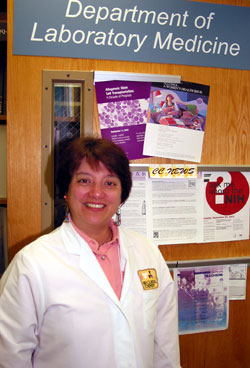
|
|
Chris King, M.S., Medical Technologist, Department of Laboratory Medicine, Clinical Center, National Institutes of Health
|
1. I chose this career because...
2. My typical workday involves...
3. Equipment I use in my work includes...
4. What I like best/least about my work...
5. My career goals are...
6. When I'm not working, I like to...
|
|
1. I chose this career because...
|
Back to Top

|
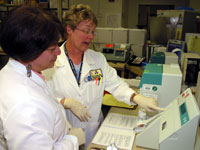
|
|
Chris King and a colleague discuss an instrument problem.
|
I chose to become a medical technologist, because I liked the challenging college program and the job outlook. When I started college, I intended to major in sociology. However, one of my classes was called “the sociology of deviant behavior”. Course requirements included working with prison inmates on-site. I didn’t think I could do that, so I dropped the course, and started rethinking my career choice.
Other majors I considered were:
- History
- Anthropology
- Teaching
- Biology
I took several courses required for these majors. Since the job market for history and anthropology majors was grim at the time, I ruled them out. I had been taking a freshman biology course and enjoyed the science, but decided against being a high school biology teacher. Then a good friend, who was majoring in Medical Technology, told me about the profession. The employability was excellent, and the profession was more in-line with my interests. It was more science and technically oriented than nursing, or any other possibility I had considered.
I completed a 3 + 1 program that entails 3 years of academia and a 1-year internship. My internship training was at a local hospital where I did laboratory rotations through different departments. I liked the hematology and chemistry labs best. I also earned a minor in chemistry, while completing my coursework.
My First Job
For my first job after graduation, I worked the evening shift in a community hospital. Because there was less staff working those hours, I rotated through the different laboratory departments, working where the need was greatest. The experience reinforced what I had learned during my internship. I could see how all the health professionals worked together. I enjoyed the autonomy, and had a real sense of helping patients.
What’s in a name?
The job title - clinical laboratory scientist – is synonymous with medical technologist. I am a member of the professional organization called the American Society for Clinical Laboratory Science (http://www.ascls.org/). Members of the organization are encouraging the official name change from the traditional medical technologist to clinical laboratory scientist. We believe it better defines what we do. You can expect that job openings, in the near future, will advertise using the new title.
Education and Certification
- Master of Science, Educational Psychology/Counseling, University of Wisconsin, Milwaukee, Wisconsin
- Bachelor of Science, Medical Technology, University of Wisconsin, Oshkosh, Wisconsin
- Certification, American Society for Clinical Pathologists Board of Registry
|
|
2. My typical workday involves...
|
Back to Top

|
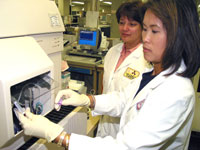
|
|
Chris King looks on as a colleague runs a test sample on the cell counter.
|
My typical workday involves completing laboratory and administrative tasks. As a mid-level supervisor, I have the best of both worlds. I get to perform laboratory bench-work as a scientist, and also carryout administrative tasks at my desk. The Department of Laboratory Medicine (DLM), is divided by the services we offer. These divisions generally correspond to a specific branch of science, for example, chemistry, microbiology, and immunology. Each service area has a team leader who is chosen because he/she is a specialist in the area. I am the team leader of the chemistry section of DLM.
My major tasks and duties include:
- Handling daily staffing issues - Each morning I make sure the chemistry section is staffed properly, and that there are enough people to work in each sub-section of the laboratory.
- Setting-up and testing equipment – I often help set-up and test the equipment we use each day, especially when we are short of staff.
- Imputing information into the Laboratory Information System (LIS) – LIS is a computer database system that stores all of our laboratory protocols, and the patient data we generate each day. Through this system, health care professionals may order specific laboratory tests and can automatically retrieve the results once completed. I routinely update the protocols and services for the system. For example, if we begin to offer a new laboratory test, I enter the information into LIS so that it too becomes available to health care professionals by request.
- Performing laboratory tests – When short of staff, I perform laboratory tests on patient blood, urine, and other body fluids.
- Checking for accuracy – Since much of our work is highly automated, we spend a lot of time checking that lab results are accurate. We are very conscientious of the quality of our work, as many doctors depend on the results for diagnosis, and other decisions about patient care. I routinely check that test results are accurate, that the instruments are working accurately, and that all data is being recorded properly. All laboratory equipment downloads it’s data each day into LIS. I review the LIS data each day to ensure that it is accurate, and to check the routing of patient data.
- Troubleshooting - Sometimes while checking instruments and lab results, I may discover a problem. This is when I work like a detective. For example, if lab results appear unusual, I need to discover the reason for the unexpected results. It could be a problem with the way a sample was drawn, or with lab equipment. We need to rule out these possibilities. I talk with the patient’s nurse or doctor about the results and look for clues about how the results were obtained. I review how the laboratory test was performed, and check the equipment used. Sometimes the lab test must be repeated. If an instrument is not running properly, I try to fix it.
- Answering questions – As the team leader and technical expert for the chemistry section, I often respond to related inquiries from other medical technicians, doctors, nurses and other health care professionals.
- Training people – I have trained nurses and doctors how to carryout lab protocols at the bedside. Sometimes there is need for them to get results quickly. I also help new employees by providing an overview of our routine protocols, and instructing them on equipment use and care.
|
|
3. Equipment I use in my work includes...
|
Back to Top

|
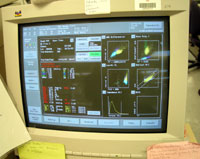
|
|
Cell counter test results are displayed on a computer monitor.
|
- Automated Urinalysis –quantifies and identifies the types of cells present in a urine sample, and displays them on a computer screen.
- Cell Counter –counts the cells in a blood sample, and sorts them by type, shape and size. Information we gain can be indicative of certain types of diseases.
- Chemistry Analyzer – measures proteins levels, kidney, liver and cardiac functioning, cholesterol levels, and drug levels in patient body fluids.
|
|
4. What I like best/least about my work...
|
Back to Top

|
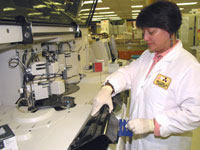
|
|
Chris King uses the chemistry analyzer.
|
What I like best about my work is the fact that I am really helping people. If you think about how doctors make diagnostic decisions, they order lab tests. It’s the primary way doctors figure out what’s wrong with a patient.
What I like least about my job is the schedule. The job entails working weekends, and sometimes being on-call. We are considered essential employees, meaning the lab must be staffed 24 hours a day, 7 days a week. We can’t miss work because of a winter snowstorm, for example. People don’t stop getting sick when the weather is bad.
|
|
5. My career goals are...
|
Back to Top

|
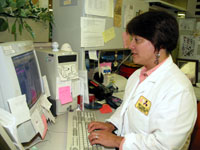
|
|
Chris King checks data in the Laboratory Information System (LIS).
|
My career goal is to do more education-related projects within my profession. I would like to combine my technical expertise, with principles of adult education, to develop materials that clinical laboratory scientists can use to maintain their skills. The need to continually update our skills does not stop with college graduation. Just like many other health care fields, we are required to maintain our skills through continuing education, which must be documented for hospital accreditation, professional certification, and/or state licensure. However, it is often difficult for people working in clinical laboratory science to attend outside training courses because of time, financial, or family constraints. An exciting project I will begin working on soon, will help alleviate those constraints. I will work with computer programmers to develop continuing education courses that are interesting and meaningful to our employees. My part in the project is to provide the content for my area of expertise. These courses will be available through our hospital’s intranet. Proof of successful completion, of any course, will be logged into the person’s electronic personnel folder.
|
|
6. When I'm not working, I like to...
|
Back to Top

|
|
|
When I’m not working, I like to play the guitar. My husband is a banjo player. We often get together with friends and play music.
|
|
|
|
 |